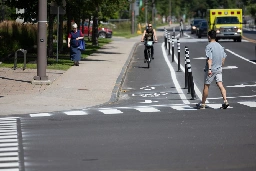(French) Quebec City will create an extensive network of protected cycle paths
(French) Quebec City will create an extensive network of protected cycle paths
Il n’y a pas que le projet de tramway à Québec. L’administration de Bruno Marchand a présenté mardi un plan pour l’aménagement de 150 km de pistes cyclables protégées aux quatre coins de la ville, inspiré du Réseau express vélo (REV) de Montréal.

English translation (note has some errors):
The news was praised by several environmental groups and cycling associations. Vélo Québec welcomed the "ambitious" vision of the capital, a city where the car still stands at the top of the pavement.
“Last year, we welcomed an additional 12,000 citizens to the Quebec City Metropolitan Region. If we don’t find alternatives to help people move according to what they want, we’re cooked,” Quebec City Mayor Bruno Marchand said at a press conference on Tuesday.
“Today we need to act,” added the Mayor. Waiting for more deaths, more congestion, more trouble, waiting for even more sclerotics would be a lack of courage. We won't do that. ”
The City of Quebec gives itself 10 years to complete these 14 axes of its Cité Vélo Corridor (CVC). It estimates that 30 million dollars will be needed to set up this network. Half of the budget, or 15 million, is expected from the provincial government. Quebec wants to complete 90 km of the network within 5 years, and the 150 km by 2034.
The network will travel from the city centre to Val-Bélair, the airport or the east of Beauport. The mayor placed great emphasis on the scale of this cycle network inspired by the Montreal REV.
Opponents of his tramway project liked to repeat that the first phase did not go to the suburbs, a way of discrediting him. “More than 85% of the city’s 35 neighborhoods will be served by the HVACs,” insisted the mayor, who may expect another divide between centre and suburbs on this issue. The issue of transport is a sensitive issue in the capital.
The goal of City Hall is clear: to provide a safe and effective option for those looking for an alternative to the car.
In the capital, 50 per cent of travel of less than 1 km is made by car, as is 77 per cent of travel of less than 5 km. The city therefore believes that many citizens could choose to abandon the car if they had protected cycle tracks.
“When we combine the modal share of pedestrians and cyclists, we are at 12.5%. The best cities are 40%. We have a long way to go,” said Mayor Marchand.
“We start from nothing,” he added, promising to share with the public the figures on the evolution of the use of active transports in Quebec as they become available.
Exit the car?
The Marchand administration was not in a position on Tuesday to say whether car lanes will be entrenched. Planning is still in its infancy. The map presented to the media is still a draft, and the City wants to consult with the public to know in particular which streets the HVAC will pass.
Several questions from journalists focused on the impact of the project on the car area. “The aim is not to remove lanes or to say that they will not be removed. The goal is to find the best route,” said the mayor.
"I'm taking the car, and I'm going to keep taking it," added Bruno Marchand. “If you can’t do it [use active transport in your week because your reality prevents you from doing so, there’s no stake, I’m not going to judge you. The goal is to tell people that when it comes to your schedule, you will have a choice and you will have a safe choice. ”
The mayor assured that he did not expect a new beak with the Quebec Coalition's government. The town hall has 15 million provincially. But Mr. Marchand will move forward, whether Quebec’s money is there or not, he said.
Environmental groups reacted positively. Angèle Pineau-Lemieux, spokesperson for Sustainable Transport Access, saw the announcement as a “major turning point” for Quebec.
“For us, it is necessary. All cities around the world are making efforts for sustainable mobility, if Quebec did nothing, it would be incredible,” said Alexandre Turgeon, Director of the Regional Environment Council of the Capitale-Nationale.
“When I hear them say, we will not withdraw traffic lanes,” I even find them shy,” added Mr. Turgeon.